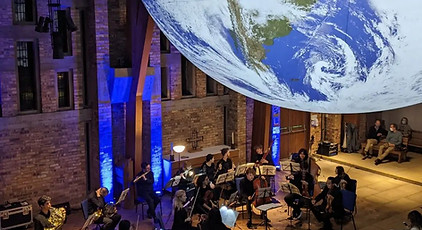
Collective action can solve our climate crisis.
Here are things you can do to help.
Different people can make different adjustments. We're not here to preach.
But here some high-impact changes you could make help our planet.

EAT
How we eat has a big impact on our planet. So how can you eat green?

INVEST
Learn how we use music to drive meaningful environmental impact.
VOTE
Your vote is your chance to influence decisions on a local, national and international scale. Next time you're voting, bear the planet in mind.

Tickets for trees
For every ticket sold to an OFE concert, we plant
a tree with the Eden Reforestation Projects. This is
not to offset emissions, but to give our performances an additional positive environmental impact.
Eden is one of the most cost-effective reforestation projects on the planet, recreating healthy forest systems that restore hope, alleviate suffering, and empower people. In the countries where they work—Ethiopia, Madagascar, Nepal, Haiti, Indonesia, Mozambique, Kenya, and across Central America—deforestation has caused extensive damage to natural ecosystems and exacerbated extreme poverty among forest-dependent human communities.
Eden collaborates directly with local communities, employing them and providing them with the education and tools necessary to plant and cultivate trees. These new forest systems restore habitats for animals, purify water sources, control flooding and erosion, and replenish soil with nutrients needed for farming, stabilising agricultural communities and allowing them to grow.
Sustainable Touring
Touring is one of the most powerful ways we can spread our message, work with communities abroad, and reach a wide variety of audiences. But it also comes with the potential for huge carbon emissions, so from our very first tour we have been committed to pioneering a sustainable approach to touring that we hope will form part of a broader cultural shift. We believe these methods not only minimises our impact on the planet but actively improve and enrich the tours themselves.
One of the simplest ways we do this is by touring with a small orchestra of around 25 players, often less. This immediately eliminates per-capita emissions. Far from being an artistic compromise, this allows us to perform in small, regional venues that are usually situated in remote areas of outstanding natural beauty. Such places often play host to composers, but rarely to orchestras playing their music. For projects requiring larger numbers, we love teaming up with local orchestras, creating a hugely beneficial cultural exchange. We also don't bring our own crew or technical equipment, but prefer instead to work with local technicians and stage managers.
When it comes to transport itself, our policy is simple: we don't fly. The carbon impact of air travel so far exceeds equivalents by land and sea that its use is unjustifiable, no matter how high quality our international concerts and conservation projects are. Besides, Europe has an outstanding network of railways and roads that come with none of the logistical complications of getting instruments like timpani and double basses onto an airplane. Travel by train and coach is also sociable, relaxing, and affords us the chance to see the landscapes we traverse much more than we could by air and reach locations far from the usual airport circuit.
We plan our routes with great care, keeping the overall geographical area small and eliminating unnecessary travel to ensure maximum efficiency. This creates a win-win because shorter travel times between venues are much less tiring for our musicians, allowing us to be on top form for every concert. We also frequently perform more than one programme in each location and engage in our various environmental and community projects, making the most of our visit.

